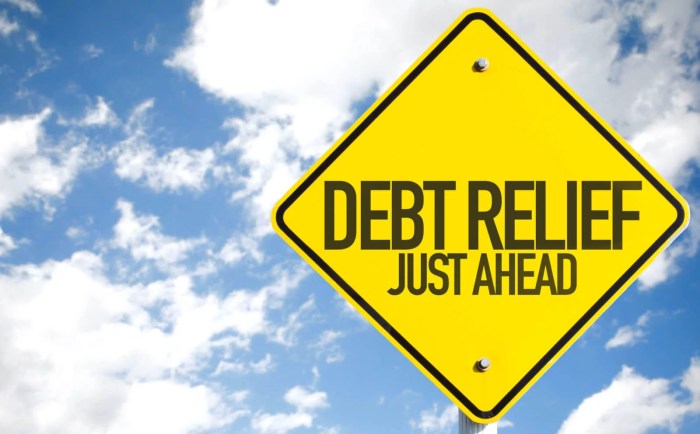
Debt relief is like finding a hidden treasure map leading you to a debt-free paradise! In this financial adventure, we explore the various paths you can take, whether it’s negotiating your way out, seeking bankruptcy as a fresh start, or learning the art of consolidation. Each trail has its own pros and cons, and we’re here to help you navigate through them with a sprinkle of humor and a dash of creativity.
Get ready to uncover the secrets of credit counseling, where professionals can help you untangle your financial web, and discover the magic of debt consolidation techniques that turn your multiple payments into one easy-to-manage monthly fee. With tables comparing options and essential questions to ask counselors, you’ll be well-equipped to tackle your debt like a superhero in a financial comic!
Debt Relief Strategies
In the wild world of finance, debt can feel like an overgrown jungle, and if you’re not careful, you might just get lost in it. However, fear not! Various debt relief strategies are lurking in the shadows, ready to guide you back to financial freedom. Let’s swing on the vines of knowledge and explore the methods available for taming that terrifying beast known as debt.Debt relief comes in many flavors, each with its own unique recipe for success.
Whether you choose debt settlement, bankruptcy, or negotiation, understanding the ins and outs of each method can make a significant difference. Below, we’ll break down these strategies, complete with pros and cons to help you navigate your options with the precision of a well-aimed dart.
Debt Settlement
Debt settlement involves negotiating with creditors to reduce the total amount owed. It’s like bargaining at a flea market, but instead of haggling over an antique lamp, you’re trying to lower your credit card bill. Pros of Debt Settlement:
- Can significantly reduce the total amount owed.
- May offer a quicker resolution than other methods.
- Less damaging to credit score compared to bankruptcy.
Cons of Debt Settlement:
- Potential tax liabilities on forgiven debt.
- Creditors may not agree to settle.
- Can negatively impact credit score initially.
Bankruptcy
Bankruptcy is the legal way to declare that you’re unable to pay your debts and get a fresh start. It’s the financial equivalent of ringing the bell on a boxing match, but this time you’re throwing in the towel instead of going another round.Pros of Bankruptcy:
- Can wipe out many types of unsecured debt.
- Gives a fresh financial start.
- Stops creditor harassment immediately.
Cons of Bankruptcy:
- Severe impact on credit score for years.
- Certain debts (like student loans) often remain.
- Assets may be liquidated to pay creditors.
Negotiation
Negotiation is essentially asking for a financial favor from your creditors. Think of it as a polite request to your landlord to lower your rent—except instead of a landlord, it’s a faceless corporation, and instead of rent, it’s your debt.Pros of Negotiation:
- Can lead to lower monthly payments.
- Maintains a good relationship with creditors.
- Flexible terms can be arranged.
Cons of Negotiation:
- Not all creditors will be willing to negotiate.
- May require a lot of time and persistence.
- Could still result in a credit score dip.
Comparison of Debt Relief Options
To provide a clearer perspective on these options, here’s a table summarizing their effectiveness:
| Strategy | Debt Reduction | Impact on Credit Score | Speed of Resolution |
|---|---|---|---|
| Debt Settlement | High | Moderate | Fast |
| Bankruptcy | Very High | Very High | Slow |
| Negotiation | Moderate | Low | Variable |
Choosing the right debt relief method is like picking the right tool for a job; using a hammer to fix a leaky faucet is just going to cause a whole lot of splashing!
Credit Counseling Services

When life throws you a financial curveball, credit counseling can be your trusty sidekick, swooping in to save the day! These services play a pivotal role in helping individuals manage their debts and improve their overall financial health. Think of credit counselors as your financial GPS; they guide you through the maze of debt and help you arrive at your destination: financial stability.Credit counseling involves a professional assessment of your financial situation, assisting you in creating a budget, and exploring options to reduce or manage your debt.
These services can help you understand your credit report, negotiate with creditors, and develop a repayment plan tailored specifically for you. With the right credit counselor, you can regain control over your finances and find your way back to the sunny side of financial freedom!
Finding Reputable Credit Counseling Organizations
Finding a trustworthy credit counseling organization is like searching for a needle in a haystack—but a needle that actually helps you, not one that stabs your wallet! Here are the essential steps to ensure you’re on the right path:
1. Research and Reputation
Start by looking for non-profit organizations with good reviews. Check if they are accredited by the National Foundation for Credit Counseling (NFCC) or the Financial Counseling Association of America (FCAA).
2. Ask for Recommendations
Don’t be shy! Ask friends, family, or even your local community center for recommendations. Word-of-mouth is often the best form of advertisement.
3. Check for Complaints
Use platforms like the Better Business Bureau (BBB) to check for any complaints against the organization. A good counselor should have more satisfied customers than unresolved issues.
4. Understand Fees
Reputable credit counseling services should be transparent about their fees. If they’re hiding their rates like a magician hiding a rabbit, it’s a red flag!
5. Initial Consultation
Many counselors offer free initial consultations. Take advantage of this to gauge if they’re a good fit for you before committing.Prior to engaging a credit counselor, being prepared with the right questions can make all the difference in ensuring you find the right fit. Here’s a handy list of essential questions to ask:
- What qualifications do you and your counselors have?
- Is your organization accredited?
- What services do you provide?
- What are your fees, and how are they structured?
- Do you offer a free initial consultation?
- How will you handle my debts? Will you negotiate with creditors on my behalf?
- What is your approach to budgeting and financial education?
- Can you provide references from past clients?
- How long will the process take to see results?
- What happens if I can’t make a payment?
By keeping these questions in your back pocket, you can ensure that the credit counseling service you choose is not only reputable but also tailored to your needs. With these tips, you’ll be on your way to turning your financial frown upside down in no time!
Debt Consolidation Techniques

Debt consolidation may sound like a wizard’s trick to disappear your debt (minus the magic wand), but it’s more about combining your financial burdens into a single, manageable package—preferably one that doesn’t weigh you down like a boulder on a tightrope! In the realm of debt relief, understanding various consolidation techniques is essential for waving goodbye to high-interest frustration and welcoming a more organized financial future.When it comes to alleviating debt, individuals have several options at their disposal, each with unique perks and potential pitfalls.
Let’s dive into the different methods of debt consolidation, including personal loans and balance transfer credit cards, ensuring you have the knowledge to select the best path for your unique financial situation.
Debt Consolidation Methods
Selecting the appropriate debt consolidation method is crucial to achieving financial freedom without feeling like you’re stuck in a never-ending game of Monopoly. Here’s a rundown of popular consolidation techniques along with their characteristics:
- Personal Loans: These are loans taken from banks or credit unions specifically for the purpose of consolidating debt. They usually offer fixed interest rates and predictable monthly payments, making budgeting a breeze. However, your credit score plays a significant role in the interest rate you’ll receive.
- Balance Transfer Credit Cards: This involves transferring your existing credit card debt onto a new card that offers a lower interest rate or a promotional 0% APR for a limited time. It’s like getting a ‘get out of jail free’ card, but for your debt! Just be wary of balance transfer fees and the interest rate that kicks in after the promotional period.
- Home Equity Loans: If you own a home, you may be able to borrow against its equity to consolidate debt. This option often provides lower interest rates, but it comes with the risk of losing your home if you can’t make payments.
- Debt Management Plans: These plans involve working with a credit counseling agency to negotiate lower interest rates and create a structured repayment plan. Think of it as having a personal trainer for your finances—minus the sweat and gym memberships.
When choosing the best debt consolidation option, consider the following criteria to avoid ending up in a financial circus:
- Your Credit Score: A higher score generally opens the door to better interest rates. If your credit isn’t in tip-top shape, you might end up with a loan that feels more like a gremlin than a fairy godmother.
- Debt Amount: Assess the total debt you’re looking to consolidate. Some options, like personal loans, may have limits on how much you can borrow.
- Interest Rates: Always compare the interest rates of your current debts with potential consolidation options. The goal is to lower the overall cost, not inflate it like a balloon at a birthday party.
- Repayment Terms: Different methods come with varying repayment timelines. Make sure the terms fit comfortably within your monthly budget to avoid the day when you regret your financial decisions like a bad haircut.
Interest Rates and Terms for Popular Debt Consolidation Products
Understanding the interest rates and terms associated with popular debt consolidation products can help you make an informed decision. Here’s a handy table summarizing some commonly available options:
| Product | Interest Rate | Loan Term |
|---|---|---|
| Personal Loan | 6% – 36% | 2 – 7 years |
| Balance Transfer Credit Card | 0% – 25% | 12 – 21 months (promotional period) |
| Home Equity Loan | 3% – 10% | 5 – 30 years |
| Debt Management Plan | Negotiated rates (often lower than current) | 3 – 5 years |
Always ensure you read the fine print and understand any additional fees or conditions that may apply. This way, when you’re ready to take the plunge into debt consolidation, you’ll be doing so with the confidence of a tightrope walker who just discovered their balance!
Final Conclusion
As we wrap up this whimsical journey through the land of debt relief, remember that you hold the key to unlocking a brighter financial future. With the right strategies, advice from credit counselors, and a sprinkle of determination, you can conquer the mountain of debt and dance your way into financial freedom. So, don your cape, gather your resources, and start your quest for debt relief!
FAQ Explained
What is debt relief?
Debt relief refers to the process of reducing or eliminating your debt through various strategies like negotiation, settlement, or bankruptcy.
How can I find a reputable credit counselor?
Look for non-profit organizations, check reviews, and make sure they are accredited by a recognized body like the National Foundation for Credit Counseling (NFCC).
Is bankruptcy the best option for debt relief?
It depends on your situation; bankruptcy can offer a fresh start but may impact your credit score for years. Weigh the pros and cons carefully!
What is debt consolidation?
Debt consolidation combines multiple debts into a single loan or payment, typically aiming for a lower interest rate and easier management.
Can debt relief affect my credit score?
Yes, many debt relief options can temporarily lower your credit score, but they may ultimately lead to a healthier financial profile in the long run.







